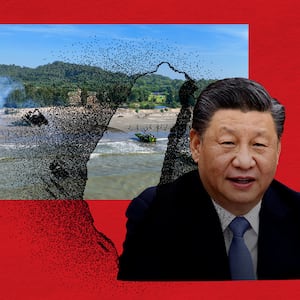“The biggest surprise for China was that Russia totally misjudged its own power. We thought that Russia would win a very fast war,” the Chinese expert explained ruefully, a few weeks after the invasion.
This was not the official line, which was then in the phase of intense attempts to persuade global audiences that Beijing had no idea what was coming. But it was a better reflection of Chinese foreign policy thinking than either playing innocent or repeating ad nauseam that the invasion of Ukraine was the responsibility of the United States and NATO pushing a big power against the wall. One of the main reasons behind Beijing’s resistance to such entanglements in the past was not because partners and allies weren’t useful but because the countries in question risked dragging China down with their mistakes. The “Pakistan model,” which China had been touting, was conditioned by exactly this experience: Beijing didn’t want to get stuck defending every Pakistani intervention in Kashmir or inadvertently drawn into a conflict with India, so it confined itself to providing the capabilities its friend needed and then staying above the fray. Russia was not the first Chinese partner to believe it would win a very fast war and found itself in a hole, but China wasn’t usually pulled into it with them.
The problem Beijing faced in 2022 was that in crucial areas, it was still too soon to make a break with the West. China remained dependent on the U.S. dollar system. For all the speculation about renminbi internationalization, Chinese payment systems, and its new digital currency, China was barely any closer to constructing a resilient alternative financial architecture than it had been in 2014. The technology story was equally problematic: despite the massive push to build its own semiconductor industry, Chinese firms were still painfully reliant on U.S. intellectual property. This left many of its companies exposed if they continued to do business in Russia, much like any other sanctioned entity. It was Huawei’s and ZTE’s sanctions-busting dealings in Iran that had risked decimating the two firms once the United States had the legal justification to go after them with full force. Now articles entitled “Is Russia the New Huawei?” were popping up, as the United States applied the same Foreign Direct Product Rule restrictions to the entire Russian tech sector that had been the final blow for Huawei’s 5G plans in the UK. Circumvent them, and those Chinese firms could kiss goodbye to their advanced semiconductors. The net effect was that from banks to telecoms, most of the companies that might have wished to take advantage of the newly opened vacuum in the Russian market instead faced even greater limitations on their activities.
Almost as bad for China, the narrative about a West divided and in decline was becoming harder to sustain, to the extent that its propaganda outlets stopped trying to advance it at all. Beijing had been able to make considerable hay with Trump, COVID, Brexit, the U.S. withdrawal from Afghanistan, and much else in recent years. But now it was confronted with a different picture. The sanctions put in place by the United States, Europe, Japan, and a healthy array of other states in Asia were not the thin gruel of 2014 but far more potent in their effect—and disturbingly replicable for China too. Central bank sanctions threatened China’s $3 trillion foreign reserves war chest, prompting emergency meetings between Chinese regulators and banks to discuss how to protect China’s overseas assets from comparable measures. The new U.S.-led plurilateral grouping established on Russian export controls, comprising countries wielding more than half of the world’s GDP, could deny China critical components and technologies too. It was the first such effort on this scale since the entity that did the job during the Cold War—the Coordinating Committee for Multilateral Export Controls, more widely known as COCOM—was retired in favor of a multilateral regime in its aftermath.
In addition, Beijing watched companies simply writing off tens of billions of dollars of assets in Russia as they fled for the exits, going well beyond any formal requirements by Western governments. It undercut one of China’s most important hedges: Xi had personally laid out plans to tighten international firms’ dependence on China in order to form “a powerful countermeasure and deterrent capability against foreigners.” That countermeasure and deterrent now looked a great deal less effective. Surveys of sentiment among international investors in China, which had held up during the early stages of the pandemic, weakened sharply. The combined effect of investors’ anxiety about being swept up in the Russia sanctions directly, and a repricing of risk in light of fears that China could go through a repeat of the Russia experience itself, was one factor.
As the FBI director, Christopher Wray, noted in a speech: “There were a lot of Western companies that had their fingers still in that door when it slammed shut. If China does invade Taiwan, we could see the same thing again, at a much larger scale. Just as in Russia, Western investments built over years could become hostages, capital stranded, supply chains and relationships disrupted.”
Xi’s continued pursuit of a zero-COVID policy, rendering global supply chains increasingly dysfunctional after two years of strict lockdowns in coastal economic hubs, had even greater immediacy for firms’ bottom line. Nearly a quarter of European companies surveyed in April 2022 said they were now considering moving out altogether. As the head of the EU Chamber of Commerce there, Jörg Wuttke, put it:
<p>Western companies are grappling with the scenario that they would have to leave China—just as they are now leaving Russia—if China tried to forcibly integrate Taiwan. And it doesn’t help, of course, that China is adopting Russia’s aggressive rhetoric. The effect is the same as from the COVID policy: foreign companies are hitting the pause button. New investments are suspended for the moment... The president has maneuvered himself into two dead ends at once: He can’t change his COVID policy, and he can’t change anything about his friendship with Vladimir Putin.</p>
The China risk was being priced differently now. The military picture was also troubling to Chinese policymakers. Backed with Western training, arms, and intelligence support, the domestic will to resist, and a public opinion climate in the West that saw the war in starkly black and white terms, Ukraine was proving far more resilient than China had anticipated, even without direct NATO military involvement. The read-across to Taiwan was not reassuring: what would already be an extremely difficult military operation for a PLA inexperienced at real warfighting—potentially involving a complex amphibious assault, and the intervention of both the United States and Japan—now looked even more daunting, especially once the wider strategic context was taken into account. As one widely circulated analysis document by a group of influential Chinese think-tankers argued:
<p>The changing nature of warfare dictates that Putin cannot win in the true sense of the word... The war is being updated in real time on social media, the impact of the war is expanding from the maritime to land to air transport and gradually affecting regional trade links; transnational capital is being withdrawn and projects are being stalled. War is no longer simply a military conflict but a broad economic war. The issue of territorial borders is no longer the most important aspect. Even if Putin wins militarily, he will not win the war.</p>
China’s bet was that the world’s liberal democracies were on the wane, incapable of collective mobilization in the face of a common challenge. Instead, Beijing was watching the country that was supposed to be its great strategic asset helping to bring about precisely the coalitions and instruments of economic warfare it had sought to prevent.
Western policymakers had failed to deter Russia, surprising even themselves with the breadth of the financial measures taken. An economy based on commodity exports could always find buyers too, blunting at least the short-term effectiveness of any efforts to place Moscow under a constrictive squeeze. Yet China could not afford to be sanguine about the consequences for its own situation if the liberal democracies delivered a like-for-like response to a future case of Chinese belligerence.
The factors that made Beijing vastly more capable as a strategic competitor than Moscow—the breadth, scale, and sophistication of its integration into the global economy—also made it more vulnerable if international banks, insurers, software companies, and semiconductor manufacturers suddenly cut it off. Western policymakers and firms were also starting to work backward from some of these worst-case scenarios—which would be immensely costly for them too—to look at how to mitigate their own vulnerabilities. Re-shoring, near-shoring, friend-shoring, diversification, and a host of other phrases had moved from the fringes to the mainstream and into firms’ operational planning. Even for those who wanted to keep some version of globalization alive, it no longer had China at the center. As one European policymaker remarked soon after the invasion: “Everything we had been talking about doing during COVID was still a choice; now it’s a necessity.”

No Limits: The Inside Story of China’s War with the West copyright © 2022 Andrew Small. Used by permission of Melville House, Brooklyn NY. All rights reserve






